 |
| The Dark Knight in the 1980s by Jack Seabrook & Peter Enfantino |
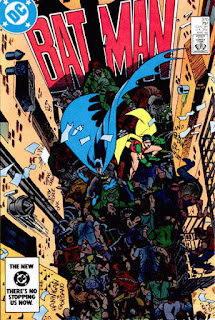 |
| Hannigan/Giordano |
"Up Above the Sin So High..."
Story by Doug Moench
Art by Don Newton & Alfredo Alcala
With Batman still away in Montreal, Robin makes the questionable decision to patrol the mean streets of Gotham City on his own. He sees two hoods busting up a video arcade with crowbars and intervenes, learning that they work for Dr. Fang, who is displeased that the arcade's owner procured his machines from another distributor. Robin beats up the duo but they escape, so he follows them.
Meanwhile, Dr. Fang is working out and fancies himself a cross between Muhammad Ali, Bruce Lee, and Laurence Olivier. Harvey Bullock pays the bad doctor a visit and agrees to commit some unexplained nefarious acts for a share of the money. The next day, Bruce Wayne returns home but is too busy to listen to Jason Todd, who is anxious to update his mentor on the fruits of his patrol the night before. Alfred and Julia join them for a barbecue that is interrupted by Harvey Bullock, who claims to be working both sides of the street and suggests that the Wayne Foundation can help bring down Dr. Fang.
Batman and Robin head to Dr. Fang's location, fight off a squad of goons, and Dr. Fang beats a hasty retreat after nearly sinking his chompers into the Boy Wonder's throat. Dr. Fang heads to the dentist for a quick fang repair, while Batman asks Robin to explain what happened the night before.
Jack: I'm having trouble buying Dr. Fang as a serious adversary for the Caped Crusader, despite his self-proclaimed fighting expertise--he doesn't seem particularly menacing, and his big plan seems to be to take over the burgeoning video game business. Jason's inability to get Bruce's attention seems unlikely, as does the hint that Bruce may have romantic feelings for Alfred's daughter. C'mon, Wayne, calm down! Does every sweet young thing represent a potential conquest? The art, as usual, is good, but this issue is a letdown after some of the stories we've read from Moench lately. The focus on video games, which were hugely popular at the time, is corny, and what's with the title, "Up Above the Sin So High..."? I don't see the relevance to the story. It seems like the kind of dopey wordplay Doug would have engaged in while at Warren.
Peter: Yeah, this was weak. The video game dialogue and references to then-current (and now, I'm sorry to say, forgotten) Olympians sure date this one. There's also way too much whiny Jason, and the plot goes nowhere. I also thought Bruce's horn-doggin' right in front of Alfred was in bad taste, but perhaps Wayne is actually just a spoiled billionaire who fights crime and gets everything he wants now and then. Let's put this one in the rear-view and hope for better adventures ahead.
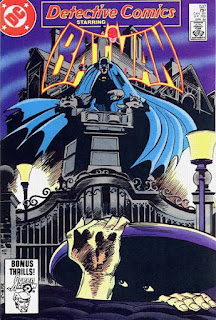 |
| Colan/Giordano |
"Down Below"
Story by Doug Moench
Art by Gene Colan & Bob Smith
While searching Gotham for Dr. Fang, Batman hears the disturbing wail of "Murder!" Ascending from the sewers, a man approaches the Dark Knight and pleads with the hero to accompany him back into his home "Down Below." Wading his way through several corridors of floating filth (yecccch!), Batman arrives at the strange man's camp atop a dry piece of ground. There, the man pulls a body from below the slime and Batman surmises that it must be one of Dr. Fang's deceased rivals, dumped unceremoniously by Fang's henchmen.
The Caped Crusader's new friend identifies himself as Sixto Morales, a fugitive wanted for murder in Mexico. Morales stresses that the man he killed had murdered Sixto's wife and that the act had been committed in the throes of madness. Batman nods his head in sympathy but tells Morales that a human cannot live down below; Morales merely beckons the hero to follow him. In the next chamber lies an elaborate matchstick recreation of the village Sixto Morales had fled, a place he'd love to return to but knows he cannot. Surely, Batman would understand and keep his trap shut so he can live out his days in peace and quiet?
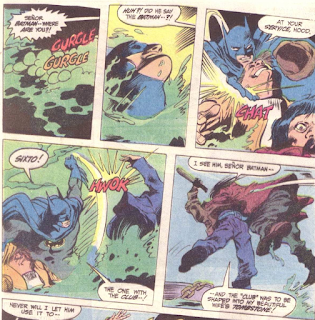 |
| Just Bleccccch! |
Peter: In the business, we call this a "human interest" story, but "boring" is a good, one-word summary. All I could think about was the floaty stuff and the really vile secretions surrounding the characters. In one scene, Batman submerges himself to better surprise the trio of goons. All I could think was, in this instance at least, he could have done without the risk of hepatitis and just jumped the dopes when they arrived. At the climax, Bats returns to Wayne Manor and engages in a conversation with Robin; Jason never once asks, "What the hell stinks so bad?"
Jack: Colan is the perfect choice to illustrate a story set mostly in the sewers, and the relative absence of Dr. Fang from the proceedings makes me wonder if Moench realized he was a weak villain. The tale of Sixto is well done, and how about the covers on this and Batman #370? Are we entering a Golden Age of Bat-covers?
"Strike First!"
Story by Joey Cavalieri
Art by Shawn McManus
To his dismay, Oliver Queen discovers his landlord is evicting everyone in his building. The Green Arrow is not one to give up without a fight, so he talks his neighbors into a peaceful (televised) protest. Seems the landlord has an ulterior motive, one that goes back several decades, and he sends his goons in to change some minds. The Green Arrow saves the day and exposes the evil landlord's dirty past.
Peter: Though its wrap-up is quick and convoluted, I liked "Strike First!" for what it was: a nice, compact entertainment with some decent art. That opening, with Ollie sifting through a box of LPs he's found out on the curb and slowly realizing that they're his, is a hoot! Shawn McManus has become something of a low-rent Val Mayerik over the last few issues; as Jack says below, the guy is hit and miss. I do think the Arrow could become a very boring superhero unless he's propped up with some good stories and a supporting cast.
Jack: Not bad for a seven-page backup story! McManus inks his owns pencils, and the result is uneven; there are some panels where characters' faces are stretched to bizarre lengths. Still, the plot about apartment-dwellers being driven out so building owners can convert the spaces into condominiums, combined with the look at the arcade scene in Batman #370, is an interesting reminder of some things that were happening in the middle of the Reagan era.
"Nine Cradles of Death"
Story by Doug Moench
Art by Don Newton & Alfredo Alcala
A prisoner named Blake lies in a catatonic state in his bunk at the state pen, seemingly unaware that his cellmate, Collins, talks in his sleep about 50 grand that is hidden in the catacombs. A catalog for the Gotham Museum's exhibit of an Ancient Egyptian statute rouses Blake, who offers a wager to Collins: if he can steal the statute and outwit Batman, he gets the $50K; if not, Collins gets Blake's magical Catman outfit. Collins agrees and Blake soon escapes, though Collins is stuck in prison.
The next day, the Bat-Signal summons Batman to see Commissioner Gordon, who tells him that Catman broke into police headquarters, stole his Catman suit from the evidence room, and left Batman a note that challenges the Caped Crusader to catch the Feline Fury. Batman relates Catman's history to Robin while they search for him in Gotham. The next day, Jason comes home from school to tell Batman about a field trip to the museum where the Egyptian statue is on exhibit.
The Dynamic Duo race to the museum, where Robin is soon caught in a giant Cat's Cradle. Batman faces off against Catman in the Hall of Warfare and appears on the verge of meeting his doom. The next day, Collins reads a fake newspaper headline that says Catman stole the statute and defeated Batman. It's a ploy to get Collins to lead them to the missing loot. Collins sits in his cell, carving a gun to make his escape.
Jack: "Nine Cradles of Death" is the kind of Batman story I enjoy, from the big, Jerry Robinson-ish splash page showing a giant Catman towering over a tiny Batman, to the seemingly endless litany of puns on the word "Cat." Moench must have been flipping through his dictionary when he wrote this story! The art by Newton and Alcala is solid once again, and the subplots are kept to a minimum: Vickie Vale is jealous of Julia, who does seem to have the hots for Bruce; Dr. Fang places a bet on a boxing match.
Peter: This was obviously a Moench-homage to the grand old DC of the 1960s, and it succeeded brilliantly (in fact, it's better than most of the 1960s DC hero comics I've read). I loved the Three's Company-style dialogue between Vicki and Julia, and the Dr. Fang interlude was just enough to get me interested. Points also to Moench for using Catman as a cat-alyst for the second part of the story, which might not even involve the 14th-tier villain. The climax, where Catman turns in his bunk mate ("I can't sleep, might as well vocalize the whereabouts of my valuable stash!"), is the cherry on top. Lots of fun.
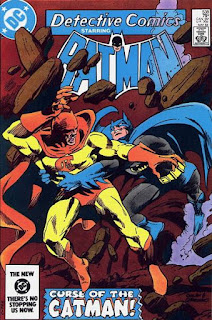 |
| Colan/Giordano |
"Clothes Make the Cat(man)"
Story by Doug Moench
Art by Gene Colan & Bob Smith
Convicted cat burglar Maul Collins receives a letter that he believes was written by his escaped cellmate, Catman, informing him that he's still searching for Collins's hidden booty. The Cat gives Collins his address and tells him to come up and see him sometime. The letter invigorates the con and he decides to make a break, whittling a bar of soap into a very convincing handgun. Collins takes a guard hostage, steals his car, and then dumps him on the side of the road outside of Gotham. Now, on to the stash!
Little does the felon know he's being played... Catman has cut himself a deal in exchange for info on Collins's stash (though that doesn't seem to be of much help), and Gordon and Batman have "allowed" the mug to make his escape. When Collins sneaks into the Catman's address and espies him sleeping, he steals the man's costume, a uniform which supposedly holds supernatural powers. Once Collins exits the apartment, Batman rises from the bed and follows.
Along the way, Collins seems to be testing the mettle of the suit, risking his life, and exiting each peril without injury. Little does he know that the Batman is rescuing the dope time and time again. Collins enters the cave where he has hidden the jewelry from his last robbery; Batman follows, not aware that the opening is just on the other side of... Wayne Manor! A rockslide buries the Dark Knight, but not before he pushes Collins to safety. The erosion has uncovered a back door into the Batcave; Collins enters and is amazed by the sights that surround him. Meanwhile, the rocks have buried Batman and, as he's digging himself out, he comes across the stolen loot.
When the escaped con starts messing with "volatile chemicals" in the Batcave, Batman must exit the shadows and explain the whole convoluted mess to the bewildered Collins. Robin enters to explain that he's found the jewels, and the boys deliver the faux Catman to Commissioner Gordon. When they return to Wayne Manor, Bruce finds a very jealous Vicki Vale staring down Julia; Bruce looks at Jason and shrugs. What, me worry?
Peter: This is one of the dumbest entries in the Batman comics of the 1980s we've yet encountered, full to the brim with coincidences and highly unlikely scenarios. What kind of deal did the real Catman get for his ratting-out of Collins ("He said something about catacombs. That's all I know!")? Why the heck would Gordon and Bats put a guard (and potentially the whole city) at risk to follow this guy to his stash? Do they attempt this with every cat burglar? How is it that only Robin and Gordon realize the cave is right on the other side of "the ridge" behind Wayne Manor? How could Bats not know he was heading into the backside of the Batcave? There's a switch on the wall, ferchrissakes! The whole story's back is broken by inanities, yet Doug still managed to entertain me. "Clothes Make the (Cat)man" is not brain food, but it's fun, light, entirely forgettable and, perhaps most pleasing of all, a one-off.
Jack: It seems like a questionable plan to let a felon break out of prison, put on a super-villain's costume, and bumble through Gotham, all in order to have him lead Batman to some hidden loot. Even worse is the fact that Batman has to save him repeatedly, putting the Dark Knight and others in jeopardy. When the crook happens into the Batcave, his big idea is to vandalize it! The art is very good, and it carries this otherwise lightweight story.
"Three Years Ago Today"
Story by Joey Cavalieri
Art by Shawn McManus & Pablo Marcos
The Green Arrow busts a gun-running operation down at the docks. Meanwhile, we learn why the Arrow hates guns so much. Three years before, reporter Oliver Queen was sent on assignment to interview a reclusive rock star who'd just cut his newest album. As Ollie meets the musician at the gates of the man's mansion, a "fan" approaches, shoots, and kills the former Beatle rock star.
Peter: Since this was written in approximately December 1983, that would be exactly three years after the murder of John Lennon. It's admirable that Joey Cavalieri would try to speak out on the sins of handguns in America and also pay tribute (albeit a late one) to someone he, ostensibly, held in high regard. Unfortunately, there's not much substance to "Three Years Ago Today" and its two-timeline framework is confusing; it's only in the final frame that we understand what these two events have in common.
Jack: I had to read this one twice to understand the story structure because it's so poorly presented. Marcos's inks don't help much with taming the oddly elongated faces drawn by McManus. This strip is going nowhere fast.
Peter: Circulation numbers were out this month. We usually just print the numbers and previous tallies, but I thought it might be eye-opening to reprint the circ box just as a reminder to how convoluted the business of numbers could be. Wallow through the mud and you'll discover that Detective Comics was moving 80,725 units per month in 1983 (down from 85, 049 the previous year) and Batman 97,741 (also down from the previous 108,234). These numbers would only grow worse through the 1980s.
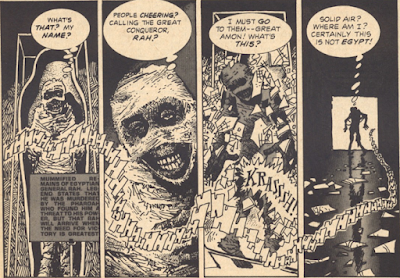 |
| Next Week... The Return of an Old Friend + The Boys Pick Their Faves From 1975-1976! |



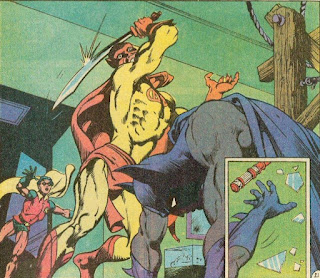


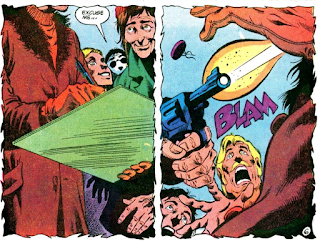


No comments:
Post a Comment